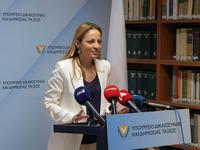Press Releases
29-01-2021 15:59
Introductory speech by the Minister of Justice and Public Order, Ms Emily Yiolitis, at the presentation of measures for Combating Corruption
Today our country is taking one more step in the admittedly strenuous effort to fight corruption by asserting the decisiveness of the Government to combat a plague that has burdened our country for decades. To this day, for this goal, various initiatives have been taken by your government and my predecessors and numerous legal and other measures have been promoted. At the same time we continue to work on an ambitious planning that will be presented henceforth and will further enhance the above-mentioned effort contributing substantially to the fight against corruption.
Firstly, allow me to refer to everything that signifies the true will of the government to fight against corruption. Everything that has been done on a horizontal level, a lot of which do not constitute the sole responsibility of the Ministry of Justice and Public Order, but rather it is included in the multifaceted approach of the Government’s fight against corruption that is now constituted by institutional decisions.
1. We have enhanced control mechanisms by reinforcing the Investigative Committees’ establishment framework, so that in their final report their judgment and also their final conclusion on the events investigated may be stated. That conclusion will now be mandatorily referred to the Attorney General in all cases where liabilities are found.
2. At the same time, with the amendment of the Criminal Proceedings Law the power to appoint criminal investigators has been granted also to the Attorney General, apart from the Council of Ministers that already has this power. Furthermore, with the amendment of the General Principles of Administrative Law, for transparency reasons, the publication of minutes and the justification of acts and decisions connected to the tendering procedures for public service contracts, as well as planning authorities decisions is obligatory.
3. We have proceeded to a legislative regulation in order to enhance the ability of the authorities to reclaim financial benefits gained through illegal activities via freezing and seizing assets. Also, the possibility to exclude economic operators from public procurement contracts due to illegal or unprofessional conduct has been established.
4. We have enhanced the framework for the investigation of cases against corruption by promoting the necessary legislative framework within the constitutional confines, in order to grant the right to waive confidentiality in private communications. This provision permits, following a court order, on the one hand the use of the recorded communication and on the other hand, always under strict conditions, to recording and/or interception of telephone conversations for the purposes of the investigation and prosecution of corruption, as well as other serious crimes.
5. Moreover, in order to enhance transparency in the public realm, we have proceeded to the amendment of Article 15 of the Constitution and then to the establishment of a legal instrument that allows, under strict conditions, certain derogations to the right to privacy. Therefore, the credibility of the control on financial declarations by the state officials has been enhanced, by entrusting control to certified auditors and publication of their assets’ declarations.
6. A further step to enhance accountability was taken in the form of transparency regulations with regard to the financial situation of political parties and candidates to state offices. This was an obligation assumed by the Government in cooperation with the House of Representatives on the basis of recommendations by the Greco Committee of the Council of Europe. Furthermore, a maximum of continuous terms for the office of the President of the Republic was set.
7. It is the first time that, for reasons related to transparency and control by the people themselves, the law provides for the possibility of access to public records. This signals that every citizen now has the means to review the acts and decision taken by the public sector.
8. Within the broader framework of good internal administration, the establishment and functioning of flexible divisions or directorates of internal control to all Ministries have been promoted. These divisions, comprising of staff that works in the Ministries/Authorities and is accountable directly to the highest-ranking department head of the Ministry / Authority, are in constant cooperation with the Internal Audit Service. This policy is the first step in creations of a first line of defense against the corruption phenomena, as the persons that will staff the divisions may intervene immediately in any case where they will observe any irregularities in contract or procurement procedures.
9. At the same time, further to the adoption of relevant legislation, an Internal Affairs’ Service in Cyprus Police has been established and it has assumed powers that allow it to effectively check and investigate every information relating to actions or omission of actions by the members of Cyprus Police that constitute corruption and abuse of power.
10.Furthermore, within the framework of our multifaceted approach, in order to fight against all forms of corruption, a specialized legal framework was established in order to fight against sporting events manipulation.
This framework regulates several matters that cover, inter alia, the protection of athletes, the establishment of an incompatibility clause pertaining to sport stakeholders, prohibition of bets by athletes and the creation of a platform for the submission of anonymous complaints. It also provides further instruments not only to the independent Committee provided for by the Law, but also to the prosecution authorities for more effectively investigating and solving cases regarding fixed matches or other forms of corruption in the sports’ world.
11. Within the same framework, in order to enhance the rules for good management in sports, the Cyprus Sports Organisation has prepared a Good Governance Code for the Cyprus Sports Federations that constitutes a mechanism for the commitment of the federations to function with transparency, democratic nature, accountability and responsibility on order to ultimately preserve the integrity and credibility of sports.
It is clear that the political will of the Government does not expend itself on the above-mentioned already implemented measures, but it is exhibited by many further draft bills, many of which are at their final preparation stage or have already been submitted to the House of Representatives and are awaiting ratification.
More concretely, a series of exceptionally important draft bills have been submitted and are still pending at the House of representative.
1. We have submitted a draft bill for the amendment of article 105 of the Penal code Law which refers to the crime of power abuse by public servants and officials and more specifically to the increase of the time of imprisonment from three to seven years, in the cases where the goal of the curprit was profit.
2. Furthermore, within the framework of political responsibility and accountability, we have tabled a proposal for defining the limits of parliamentary immunity, in such a manner that the latter is not used as a shield against prosecution for members of parliament that are burdened with crimes irrelevant to policy development. At the same time, with this proposal, the right to vote and express their opinion is safeguarded, including any declaration or act of the members of parliament while they exercise their duties.
3. In our quest for good governance, we have submitted a draft bill regulating the compliance of the Administration to the court decisions issued in accordance with article 146 of the Constitution. The draft bill sets out the procedure to be followed and at the same time provides for the possibility of sanctions’ enforcement in case any institution, public authority, or person violates the constitutional obligation for active compliance with the relevant Court decisions.
4. Apart from the above-mentioned, we have also tabled at the House of Representatives a draft bill that is currently under discussion that provides for the establishment by law of an independent authority against corruption. It is a non-governmental institution, the main responsibility of which is to undertake all necessary initiatives and actions in order to ensure the cohesion and effectiveness of public service, broader public service and private sector’s actions in prevention, treatment and fight against corruption matters.
5. We want the citizens to stand by our side and help us in this endeavour we have undertaken as a state in order to fight against the hydra-headed monster of corruption. Therefore, we have prepared a relevant draft bill that provides for additional protection measures for whistle-blowers denouncing acts of corruption, not only on the public sector, but also on the private. Leniency measures for those who are implicated but cooperate fully with the authorities for full disclosure and prosecution of the people accused of corruption are also included. Our goal is to encourage citizens to denounce acts of corruption when they see them without any fear or hesitation.
6. This mechanism is further reinforced by the draft bill for inclusion to national legislation of the EU Directive on the protection of persons reporting on breaches of Union law that has been prepared and is currently at the consultation stage.
7. Furthermore, we aim to establish clear procedures in order to avert the creation of conditions conducive to corruption phenomena.
Therefore, we are promoting a draft bill that creates the obligation to register in a relevant register kept by the independent authority against corruption and where any person wishing to get involved in such procedures and hold contacts with officials of the public and the broader public sector will be registered. For all meetings taking place, minutes must be kept and the Authority must be informed in order to ensure transparency in public decision makin processes.
8. Additionally, the effort to fight against corruption is inextricably linked to the effective and mainly swift administration of justice. Having identified this principle, the Ministry of Justice and Public Order has placed on the forefront of its priorities the holistic reform of the justice sector.
Therefore, the Government is promoting a comprehensive and ambitious programme of fundamental structural changes to the system of administration of justice aiming at promoting a swifter and more effective Justice system. A system that will ensure high levels of transparency and will lead to reclaiming the trust of the people to the Justice Administration system and to improving the image of Cyprus abroad.
I wish to also note that within the framework of this effort the following have already been established:
- A first-Instance Administrative Court that contributes to the swifter conclusion of cases affecting materially the smooth functioning of the broader public sector and has contributed to relieving the work load burdening the Supreme Court.
- An International Protection Administrative Court for procedures by asylum seekers
- An Academy for Judges, which is very important in order to ensure quality in the administration of justice.
9. Furthermore, the finalisation of draft bills for the reform and modernisation of the highest echelons of justice is at its last stage. These laws provide, inter alia, for the restructuring of the Supreme Court and the establishment of checks and balances, the operation of a separate Second-Instance Appeals Court with the establishment of Departments for specialisation purposes, as well as the enlargement of the Supreme Council of Judicature with Judges from all levels, as well as lawyers.
10. As soon as we have completed the draft bills for second instance, we will proceed to discuss and reformulate the draft bills concerning the establishment of a Commercial Court and a Navy Court that will decide by a fast-track procedure on civil commercial cases and navy military cases.
11. Additionally to the above-mentioned initiatives, the implementation of the contract for the creation of a comprehensive e-justice system has begun, which constitutes a major reform of the Cyprus Justice System. It is expected to optimise court procedures, transparency and the maximization of efficiency for Justice officials at all levels.
12. Nonetheless, an inextricable part of this procedure is the major reform of the Public Service regarding the recruitment, evaluation and promotion procedures. This reform will also contribute to the enhancement of productivity, statues and credibility of the Public Service.
These new measures we are proposing contribute decisively to the protection framework against corruption. They holistically address transparency, accountability and corruption matters by enhancing the existing institutions and by creating new further safeguards.
Our planning aims to enchance to the maximum of the legal, political, financial and social environment through actions that fall under three central pillars.
- Prevention, education and awareness.
- Legal measures.
- Risk supervision and assessment.
With regard to the fist pillar on prevention:
(a) We will proceed to the enhancement of the internal control mechanisms in the Ministries, after we assess the existing procedures, as well as possible gaps, shortages and weaknesses by defining a concrete program for continuous supervision of the efficacy and effectiveness of the internal control systems.
Also, with the measures that are implemented we aim to invest in the awareness and active involvement of the civil society.
We are investing in our youth and in the education of everyone that today or in the future will find themselves in positions of responsibility. We aim to create demanding citizens who will vindicate good governance and accountability.
In order to achieve the above, we have already proceeded to the following:
● Memoranda of Understanding between the State and several Cyprus Universities have already been checked as regards their legal aspects.
● A Youth declaration Against Corruption has been prepared and will be signed promptly. It is a declaration that makes the young people participants in the fight against corruption.
I would like to ask the Deputy Government Spokesman to present in detail the content of the First Pillar.
The 2nd Pillar includes measures for the enhancement and exploitation of the legal framework against corruption.
Our aim is to enhance the control mechanisms and the tools to fight against corruption, such as the following:
(a) A reform of the Penal Code.
(b) Establishment of a National Integrity Agency that will combine the assets’ audit mechanisms with the conflict of interest and possible incompatibility of offices.
At this point, I would like to mention especially the study that was communicated to us just two days ago by our Nobel winner, Professor Christoforos Pisssarides and the esteemed scientists Messrs. Christos Panayiotides and Nicos Syrimes with regard to the regulation of the matter pertaining to the assets of Politically Exposed Persons.
I would like to assure them that their study will receive proper attention and I soon hope to be able to meet with them for further actions.
(c) Establishment of an Independent Commission for recruitment, promotion and transfer in the Municipalities and Semi-Governmental Organisations according to the structure of the Public Service Committee and the Education Service Committee.
(d) Establishment of mandatory mobility of the human resources among positions of responsibility, where and when specialised knowledge is not a prerequisite and such mobility is for a reasonable amount of time.
(e) Modernisation of the Press Laws so that the rules for the profession of journalism and of professional journalism may cover also electronic media.
I would like to ask the Deputy Government Spokesman to analyse the content of the Second Pillar.
The 3rd pillar is concerned with risk supervision and assessment:
(a) The establishment of the Independent Authority against Corruption provides the opportunity to the citizens of Cyprus to denounce as whistle-blowers or provide data or information anonymously or not against persons that may be involved in corruption offences.
(b) We proceed to the creation of an open internet government portal aiming to better legislation implementation and also citizens’ access to public documents, regarding public procurement contracts, especially in high risk areas, such as General Health System, public procurement, planning board decisions, etc.
(c) Despite the fact that our country is not a member of the Organisation for Economic Cooperation & Development (OECD), due to the objections of Turkey, in order to enhance the credibility of the state, we proceed with an application to be included in the OECD Recommendation for Public Integrity.
(d) We commit ourselves to timely publish at an internet portal all the findings and court decisions regarding corruption phenomena, scandals, favourable treatment, conflict of interest for public servants and officials of the public or the private sector.
Notwithstanding personal data protection and with the exception of cases of ingoing criminal investigations.
(e) Of crucial importance is also the involvenent of our countries scientists. Therefore, it has been decided to establish a scientific board that will propose measures, policies and will intervene in order to enhance the anti-corruption network.
I would like to ask the Deputy Government Spokesman to analyse the content of the Third Pillar.
In closing, I would like to reiterate that we acknowledge the difficulty of our endeavour. Corruption is a major problem that has spread in all facets of the political, financial and social sectors of every country. Therefore, I would like to emphasise that in order to achieve this grandiose goals, it is necessary to have the assistance and cooperation of all, the State, the House of Representatives, the Independent Institutions and above all, the society, its organised bodies, as well as every citizen individually.
Relevant Press Releases






